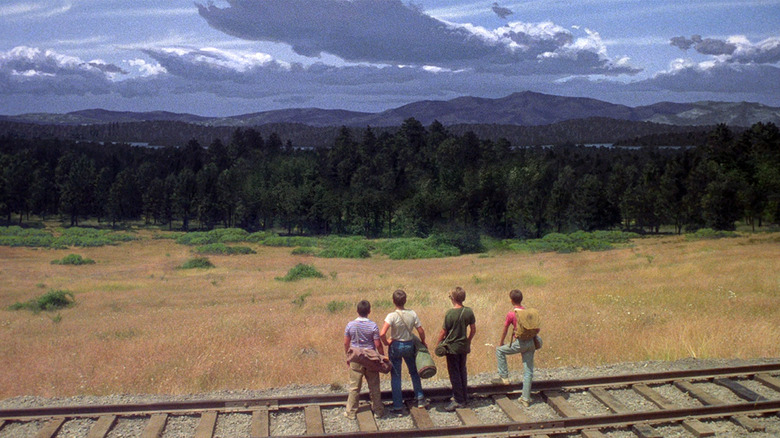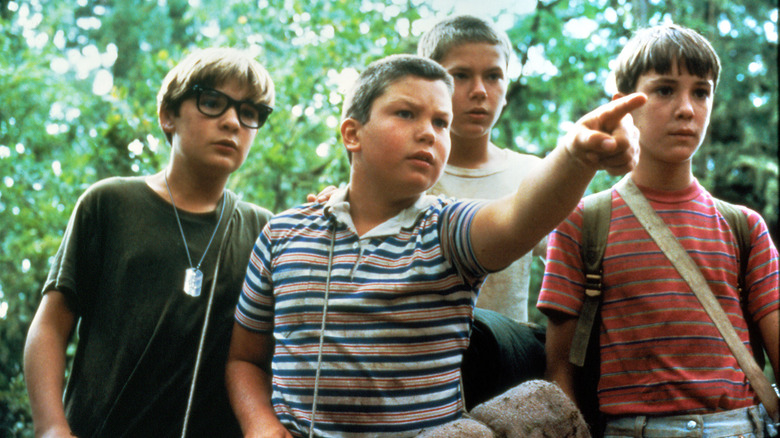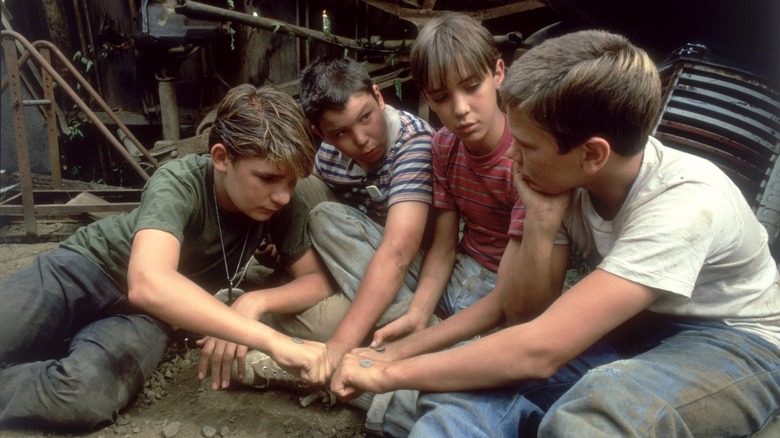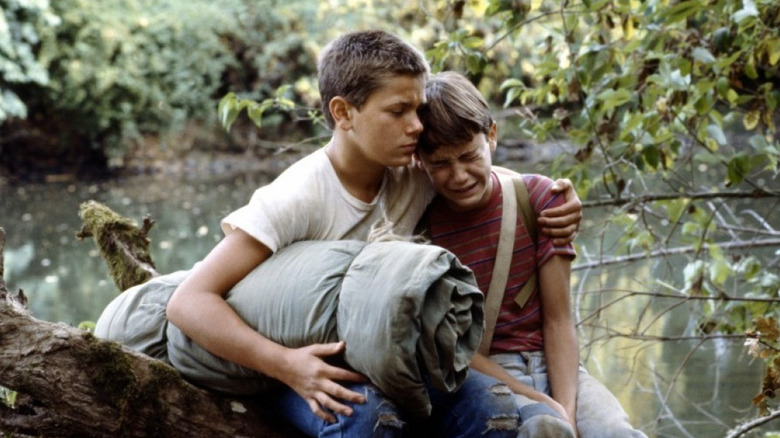The Stephen King Movie That Made The Master Of Horror Himself Emotional
One of the very best Stephen King films isn't a horror movie — it's the coming-of-age drama "Stand By Me." Released in 1986 and helmed by Rob Reiner, the film actually went out of its way to not slap King's name all over the marketing material. "We actually played down King's name because we didn't want people to have the idea that this was a bloody, gory horror movie," Reiner said (via the book "Creepshows: The Illustrated Stephen King Movie Guide" by Stephen Jones). But while "Stand By Me" may not have been sold as a Stephen King movie, it was very much a personal story for King. So personal, in fact, that when he saw the finished film, he was overcome with emotion and had to be alone for a few minutes to gather his thoughts.
"Stand By Me" is based on King's novella "The Body," which appeared in King's 1982 collection "Different Seasons." As the title slyly indicates, "Different Seasons" was a change of pace for King. The book consists of four novellas — novellas King wrote after he finished novels. As he explains in the afterward to "Different Seasons," "It's as if I've always finished the big job with just enough gas left in the tank to blow off one good-sized novella." That's right: Stephen King is so damn prolific that after he finishes a novel, he sits down and writes another long story, too. Four of those stories ended up gathered in "Different Seasons." While there are elements of horror to some of these tales, they're mostly dramas grounded in reality (the stories are "Rita Hayworth and Shawshank Redemption," which inspired the film "The Shawshank Redemption," "Apt Pupil," which was adapted into a film in 1998, "The Body," which became "Stand By Me," and "The Breathing Method," which is one of the few King works that has yet to be adapted to the screen).
"The Body" tells the story of four young friends who set out on a trek one summer afternoon in 1960 to find the dead body of a kid struck by a train. To pen the tale, King drew on memories of his own childhood, including memories of kids he grew up with (it's worth noting that King was also accused of plagiarizing part of the story from his friend George McLeod, a claim King has long denied). King also may have been drawing from his subconscious — he once revealed that when he was a child, he and another friend were playing outside when the friend was hit and killed by a train. (King states he has no actual memory of the event, but the story was relayed to him by his mother.)
Bringing Stephen King's The Body to the screen
According to "Creepshows," screenwriters Bruce A. Evans and Raynold Gideon wanted to option King's "The Body" for a movie, but they couldn't afford King's asking price ($100,000 plus a cut of the profits). To help realize their vision, the screenwriters shopped the project around to several studios, only to be rejected again and again. Finally, Embassy Communications came on board. "Fatal Attraction" director Adrian Lyne had initially been tapped to helm the film, and even worked with Evans and Gideon to sell the project. But eventually, Lyne left the film due to scheduling issues, and was replaced by Rob Reiner.
However, before production could begin, Embassy Communications was sold, and the film was immediately canceled. Thankfully, Norman Lear, who created Reiner's TV series "All in the Family," came in to rescue the film and paid for the entire budget (which was about $8 million). Eventually, Columbia Pictures would pick up and distribute the movie. Reiner wasn't much of a horror fan, but that turned out to be okay — "The Body" wasn't a horror story.
In the film, four young friends — Gordie (Wil Wheaton), Chris (River Phoenix), Teddy (Corey Feldman), and Vern (Jerry O'Connell) — learn that the body of a missing kid named Ray Brower has been discovered by a group of older teens in the woods. Ray had been struck by a train and killed, but the teens who stumbled upon his corpse decided not to report the discovery because they had just stolen a car and didn't want to get in trouble with the cops. Gordie and his friends decide to set out and find the body themselves, hoping to become local heroes in the process.
Stand By Me is a poignant movie
"Four kids go looking for a dead body" sounds like a somewhat ghoulish concept on paper, but the results are rather poignant and touching. We genuinely like the four leads, thanks to the great performances of the young actors playing them (River Phoenix is particularly excellent). As the boys set out on their journey, we learn more about them and their own personalities, fears, and dreams. Gordie, who wants to be a writer, is grieving the death of his popular older brother Denny (John Cusack). One of the most touching, heartbreaking moments arrives near the end, where Gordie breaks down crying, saying that he should've died instead of his brother. He's comforted by Chris, a kid who is clearly wise beyond his years.
"Stand By Me" is funny, sweet, and effective. King has always been good at writing young people — in some ways, "The Body" feels like a warm-up for "It," another story about a group of kids who band together and come-of-age during an eventful summer — and "Stand By Me" does an excellent job adapting King's character work to the screen. It's a pretty faithful adaptation, without remaining completely slavish to the material. It's proof that King's material is so much more than pulpy horror. And the end result had a profound effect on King himself.
Is Stand By Me the best Stephen King movie?
In the book "Stephen King at the Movies" by Jessie Horsting, Reiner recounts what happened after he screened the finished film for King the first time. "After the screening [King] appeared very, very moved and really couldn't even talk to us," Reiner said. "He said, 'I have to go away.' And he went away for about 15 minutes. Then, he came back and we sat around and talked about it and he told us how much of the story had been his life — and how upsetting it was to him. He told me that, in fact, all three of his buddies had died ... He said it was upsetting to sit there and see all these kids he grew up with on screen, brought back to life when — well, you can't ever get them back."
King confirmed his emotional response to Rolling Stone years later. After stating that "Stand By Me" was "probably" the best movie ever made from one of his books, King added: "I thought it was true to the book, and because it had the emotional gradient of the story. It was moving ... When the movie was over, I hugged [Rob Reiner] because I was moved to tears, because it was so autobiographical."
Clearly, Reiner hit the mark with his King adaptation. And interestingly enough, he would do it again: his 1990 film adaptation of King's "Misery" is also one of the best Stephen King adaptations.



